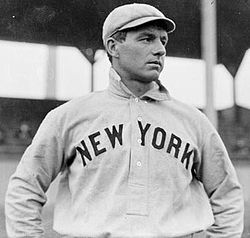| Joe McGinnity | |
|---|---|
 McGinnity in 1905 | |
| Pitcher | |
| Born: March 20, 1871 Cornwall Township, Illinois, U.S. | |
| Died: November 14, 1929 (aged 58) Brooklyn, New York, U.S. | |
Batted: Right Threw: Right | |
| MLB debut | |
| April 18, 1899, for the Baltimore Orioles | |
| Last MLB appearance | |
| October 5, 1908, for the New York Giants | |
| MLB statistics | |
| Win–loss record | 246–142 |
| Earned run average | 2.66 |
| Strikeouts | 1,068 |
| Stats at Baseball Reference | |
| Teams | |
| Career highlights and awards | |
| |
| Member of the National | |
| Induction | 1946 |
| Election method | Old-Timers Committee |
Joseph Jerome McGinnity (March 20, 1871 – November 14, 1929) was an American right-handed pitcher in Major League Baseball (MLB) in the late 19th and early 20th century. McGinnity played in MLB for ten years, pitching for the National League's (NL) Baltimore Orioles (1899) and Brooklyn Superbas (1900), before jumping to the American League (AL) to play for the Baltimore Orioles (AL) (1901–1902). He returned to the NL with the New York Giants (1902–1908). McGinnity continued to pitch in the minor leagues, eventually retiring from baseball for good at the age of 54.
In MLB, he won 246 games with a 2.66 earned run average (ERA). He had seven 20-win seasons and two 30-win seasons.[1] Including his time in the minor leagues, McGinnity won close to 500 games as a professional ballplayer.[2] He led MLB in wins five times (1899, 1900, 1903, 1904, and 1906) and ERA once (1904). With the Giants, he won the 1905 World Series. His teams also won NL pennants in 1900 and 1904.
McGinnity was nicknamed "Iron Man" because he worked in an iron foundry during the baseball offseasons. His nickname came to convey his longevity and durability, as he routinely pitched in both games of doubleheaders.[3] He set an NL record for innings pitched (434) in a single season, which still stands (and with modern MLB practices which limit pitchers' innings, is considered effectively unbreakable). McGinnity is considered one of the better players in the history of the New York Giants.[4] The Veterans Committee elected him to the National Baseball Hall of Fame in 1946.
- ^ Cite error: The named reference
signonwas invoked but never defined (see the help page). - ^ "Iron man McGinnity's iron career: in case you didn't know ..." Modern Casting. November 1, 2005. Retrieved March 27, 2012.
- ^ Wells, Michael. "Joe McGinnity". Society for American Baseball Research. Retrieved March 24, 2012.
- ^ "Sale of New York Giants Was Biggest Baseball Deal in the Long History of the Great Game". The Morning Leader. January 25, 1919. Retrieved March 29, 2012.